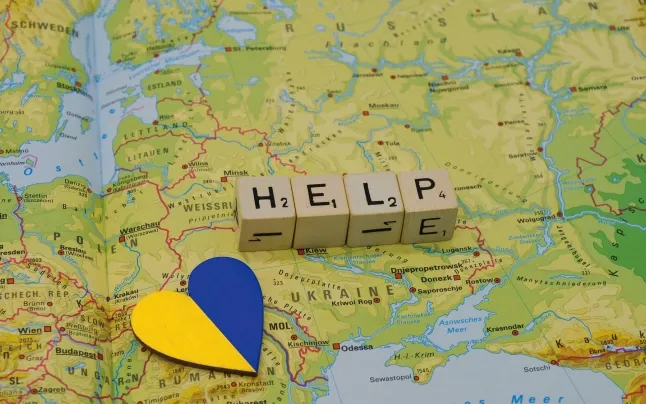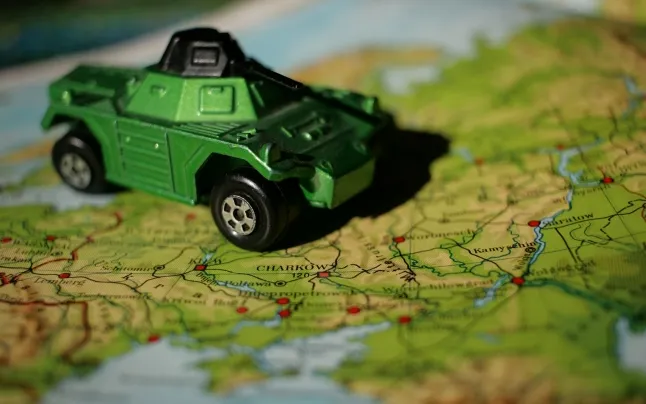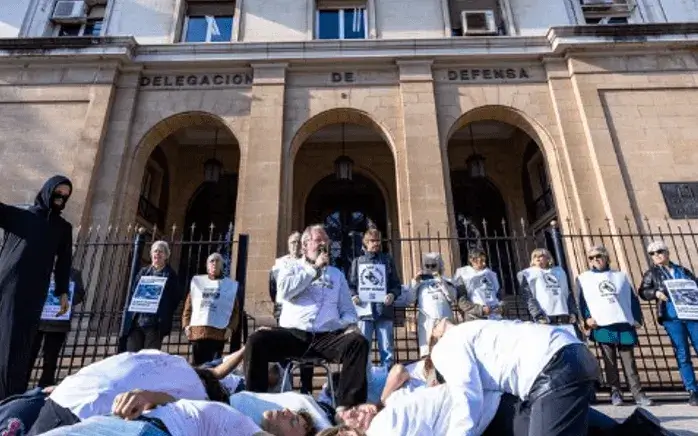Organizations such as the Fundación Lealtad and the Pan American Health Organization have developed documents with some tips for providing assistance and making it as effective as possible.
The Russian invasion of Ukraine has shaken the world and sparked a wave of solidarity with the Ukrainian people. To understand the extent of the tragedy, we only need to look at the images left by the conflict, with thousands of civilians suffering the ravages of war and trying to flee the country. In this context, many organizations and NGOs have opened up ways to help the Ukrainian people and alleviate a situation that, at this time, no one knows how long it will take.
As soon as a humanitarian crisis like this breaks out in the world, a solidarity response is activated by citizens who, in good faith, want to contribute. However, before submitting any help, there are a number of factors to keep in mind for it to be effective. Thus, the arrival of large amounts of donations to a country affected by a disaster or emergency represents a huge organizational and management challenge for humanitarian actors, which can lead to an additional burden that is difficult to manage.
A report published by the Pan American Health Organization; and endorsed by the United Nations and organizations such as Unicef, Intermón-Oxfam and the Red Cross, among others, delves into this issue and compiles a series of general and practical recommendations on humanitarian donations that can be very useful if we want to collaborate with the Ukrainian people.
In addition to this document, recently included in an article by the Solidarity NGO Coordinator, the Fundación Lealtad, which aims to promote society's trust in NGOs, has drawn up a list of tips for giving in situations of emergency like the one in Ukraine.
Why stop for a moment before sending help?
Although help in these cases can be of great value and is an act of solidarity and altruism that must be acknowledged and appreciated, the truth is that many donations are often inappropriate, hasty or ill-suited to the real needs of those affected.
This is because, among other things, there are still myths that all the help that is given is good, or that it's better to have help than not to lack it. The reality, however, is very different. Poorly organized donations can wreak havoc on investing a lot of time and money in sorting, packing, and moving. Thus, the cost-effectiveness equation of aid doesn't yield the desired result, given the effort involved in managing donations and delivering them to the affected communities.
"In the event of an emergency, times are of the essence. NGOs that are already working in the field and have experience in this kind of situation are more effective in channeling the help and material that we can send to individuals", says Ana Benavides, general director of the Fundación Lealtad.
It should also be noted that existing mechanisms for receiving and managing donations in recipient countries aren't always respected. In fact, these processes are sometimes unknown. Therefore, it's important that recipient countries have clear and useful mechanisms in place to adequately target aid offerings to the real needs of those affected.
The media also play a role in this case, which has a great influence on donation campaigns and often encourages spontaneous and indiscriminate donations without real knowledge and without assessing needs. In addition, it often happens that the public presses the media to send aid as soon as possible, without going through the recommended planning and negotiation processes so that the assistance is effective and adjusted to what is needed.
Practical recommendations for making donations
- Getting informed is basic
Before giving, you need to find out what needs to be covered, who is acting on the ground and how.
In this regard, damage assessment plans and needs analysis are a key tool in organizing donation campaigns. It's important that donors and the media keep them in mind and consult with national authorities and humanitarian agencies on the ground to find out what is really needed and what isn't.
These plans are regularly updated and must always take into account the most vulnerable sections of the population in order to target humanitarian aid as accurately and effectively as possible.
- Prioritize cash donations whenever possible
Cash donations should be promoted whenever possible because of their flexibility. In the first moment of an emergency, it allows you to take immediate action and get what's most needed in places or countries close to the affected area. In later stages, the money is used to facilitate programs and projects in order to rebuild the livelihoods of the people.
Thus, it's advisable to make financial donations, much more effective, before sending materials such as clothes, food or medicine.
- Demand secure donations and know who we are giving to
Let the urgency not play tricks on us. Donations in case of emergency or armed conflict must comply with all security guarantees regarding electronic transactions, privacy and data protection. In addition, we need to make sure that the NGO we are giving to has experience, can act quickly and diligently, and has a presence on the ground.
It's worth noting that it isn't advisable to give to a specific person, that is, not to make an online transfer or donation to an individual, but to always do so on behalf of an NGO.
- Inform and know the customs procedures before making international shipments
Making donations without clear customs processes can delay or paralyze the arrival of aid in the emergency zone. Therefore, it's advisable to consult with the Ministry of Foreign Affairs of the affected country what documentation must accompany the donation and the processes that must be followed so that the aid reaches the emergency zone as quickly as possible.
- Monitor the donation and the situation
It’s not about making the donation and staying with folded arms. You should be interested in issues such as the amount raised, the results obtained, whether new needs arise and the evolution of the emergency. Likewise, long-term collaboration is likely to be needed beyond the time of the emergency.
- The aid must respect the rights of the affected communities and fundamental humanitarian principles
The desire to help cannot underestimate the need to pay attention to the rights of people affected by a humanitarian crisis. Thus, it's essential that donations help to respect the dignity of people.
In this regard, special care must be taken with those who are most vulnerable or who are discriminated against because they often have more difficulty accessing assistance. From the very beginning, care must be taken to ensure that the care process does not aggravate situations of vulnerability, taking into account the special needs of these groups.
- It’s about complementing efforts, not duplicating them
In the event of a humanitarian crisis, countries and organizations are quick to try to alleviate the first needs that arise without knowing the actions proposed by the affected country and the resources required to achieve them. Donors need to be informed and aware of these actions to avoid efforts to meet the same needs over and over again. At the same time, it's important to know what help other donors are providing and who it is aimed at to avoid duplication.
- Don't contribute to promoting or reproducing myths circulating in an emergency situation
In the most difficult times of the emergency, the existence of myths about humanitarian assistance can influence the practice of donations, and lead to inappropriate decisions that lead to misuse of human, logistical or financial resources.









Add new comment